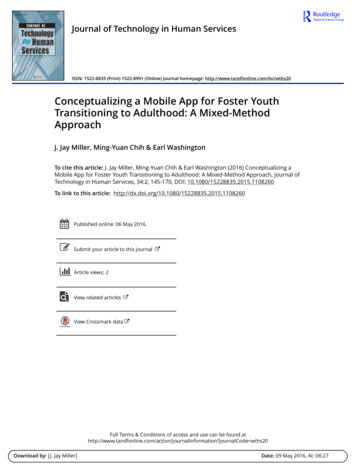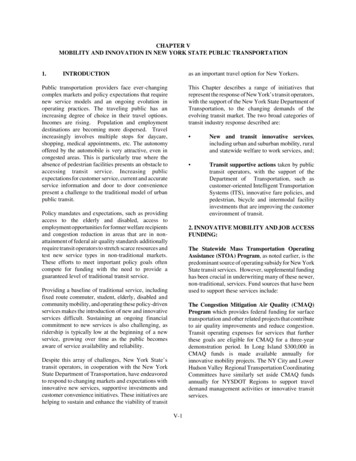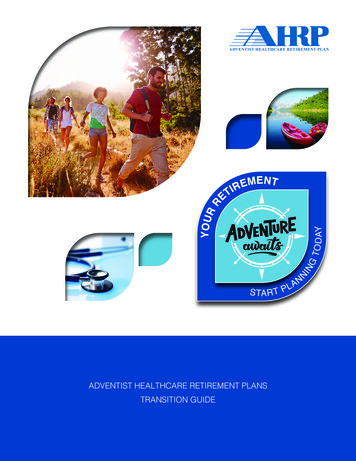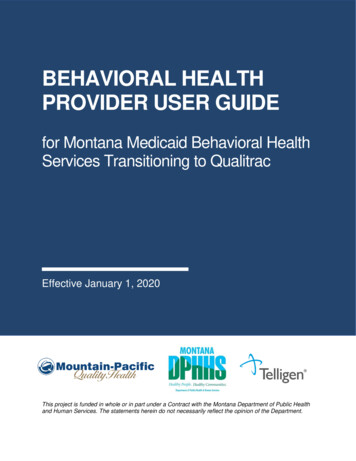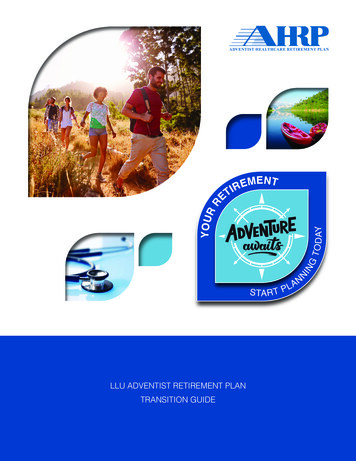
Transcription
YOUR GUIDE TO TRANSITIONING TO MEDICAL SCHOOL
BECOMEA DOCTORAs a motivated student, you are in an ideal position topursue medical school. Don’t wait to pursue yourdreams of becoming a doctor. Now is the time toleverage your college experience to achieve careersatisfaction. You owe it to yourself and your futurepatients. This guide will help you take the necessarysteps to enroll in medical school.
YOUR MED-SCHOOLQUESTIONS ANSWEREDAdmit it. You’ve wanted to become a doctor for as long asyou can remember, but you still aren’t entirely sure howto make the transition to medical school. Don’t let uncertaintyhold you back. Here, we’ll share some answers to some of thetop questions students have about medical school.1HOW CAN I STRENGTHENMY APPLICATION?2I’M NOT ACTUALLY A“PRE-MED” MAJOR.CAN I STILL APPLY TOMEDICAL SCHOOL?3SHOULD I TAKE A“GAP YEAR” AFTERGRADUATION?4WHAT IS THE BESTWAY TO PREPAREFOR THE MCAT?5HOW CAN I EASEMY TRANSITION TOMEDICAL SCHOOL?
QUESTION ONEHOW CAN I STRENGTHENMY APPLICATION?Answer: If you were not an undergraduate pre-med major, you will likelyneed to take supplemental classes to prepare for the rigors of medicalschool coursework. Depending on your specific needs, you may choose to: Take non-degree courses at a community college or local four-year school Enroll in a postbaccalaureate program (To find one near you, use theAmerican Association of Medical Colleges’ searchableONLINE DATABASE )READ OUR BLOG ENTRY exploring the(To determine which option is right for you,pros and cons of each type of program.)All medical school applicants should also volunteer in local hospitals, healthcare practices or clinics in order to gain practical experience. Medical schooladmissions committees tend to look favorably upon applicants who havealready found ways to interact with patients in real-world settings.12345
QUESTION TWOI’M NOT ACTUALLY A “PRE-MED” MAJOR.CAN I STILL APPLY TO MEDICAL SCHOOL?Answer: Of course! Many leading undergraduate institutions don’t actuallyoffer “pre-med” majors, but chemistry or biology majors are typicallywell-prepared for medical school.Even if you don’t focus on the sciences as an undergraduate, you can still trainto become a doctor because being a good doctor is about more than justscientific proficiency. You also need strong communication skills and a varietyof other “soft skills.” In fact, the newest section of the MCAT focuses onsocial sciences, in recognition of the growing need for well-rounded doctorswho understand how psychological and behavioral issues can impacta patient’s overall health.For more details,READ OUR BLOG ENTRY on how liberal arts degrees measure upto pre-med degrees.12345
QUESTION THREESHOULD I TAKE A “GAP YEAR”AFTER GRADUATION?Answer: Many med-school candidates take a year off to gain more volunteerexperience or take additional classes in order to become a more attractive applicant.READ OUR BLOG ENTRY for tips on how to use this time off to your advantage.12345
QUESTION FOURWHAT IS THE BEST WAY TOPREPARE FOR THE MCAT?Answer: Princeton Review and Kaplan Test Prep each offer extensiveMCAT prep options. For details on their offerings, along with additionalresources, READ OUR BLOG ENTRYKeep in mind that the MCAT was revised in 2015 to include a sectionfocusing on the social sciences. For additional insights that will help youprepare for this part of the exam,READ OUR BLOG ENTRY discussing what thechanges to the exam mean for prospective medical school students.12345
QUESTION FIVEHOW CAN I EASE MY TRANSITIONTO MEDICAL SCHOOL?Answer: Develop healthy habits and stress-management techniques beforeyou arrive on campus to ensure that you’ll be well-equipped to handle yourrigorous medical school course load. For more details about some of the typicalissues medical-school students face and advice on how to handle them,READOUR BLOG ENTRY on the topic.12345
FIND THERIGHT SCHOOLWhen searching for a medical school, it’s importantto explore all of your options. There are only 141 medicalschools in the U.S. offering an M.D. degree, which meansadmission is obviously highly competitive. If you don’tmake it into one of these schools what are your options?As it turns out, there are quite a few. Offshore medicalschools provide an alternative path to becominga doctor. When exploring these options, you shouldseek out a school that offers an accredited, personalizedand affordable medical education that can be tailoredto your career goals.At the University of Medicine and Health Sciences, we’veinvested more than 50 million to create one of themost advanced medical campuses in the Caribbean.Here, you’ll benefit from learning in small classesin our technologically advanced facilities and enjoyplenty of individual attention from our dedicated,US-trained faculty.Thanks to our strong affiliations with more than 20teaching hospitals in the US, Canada and Puerto Rico,we offer strong outcomes—including an impressive93% USMLE first-time pass rate—for half the tuitionof competing medical schools.We sincerely hope you’ll keep UMHS in mind as yousearch for the right medical school.
LEARNMORECongratulations on your decision to pursue a career in medicine. We areconfident in your ability to succeed in this competitive field and we hopeyou will allow us to help you get there.If you have any additional questions about our programs or how you canprepare for medical school, please don’t hesitate to reach out. We wouldlove to discuss your options with you.UMHS.ORGACCREDITATIONThe University is proud to announce that it recently received a full 6 year accreditation from theAccreditation Commission on Colleges of Medicine (ACCM), an internationally recognized accrediting body.ACCM is recognized by the National Council of Foreign Medical Education and Accreditation (NCFMEA)of the US Department of Education as having standards comparable to those in the US both as writtenand applied. The University will continue to seek other approvals and accreditations to further enhancethe reputation of UMHS.Official transcripts must be mailed to the address below.Letters of recommendation can be mailed or emailed(rbennett@umhs-sk.net, dwillis@umhs-sk.net) as longas they are on official letterhead, signed, and sent fromthe recommender. Send documents to:University of Medicine and Health Sciences, St. KittsNorth American Administrative OfficeOffice of Admissions460 West 34th Street, 4th FloorNew York, NY 10001US/Canada: 866.686.0380admissions@umhs-sk.net
UMHS.ORG Official transcripts must be mailed to the address below. Letters of recommendation can be mailed or emailed (rbennett@umhs-sk.net, dwillis@umhs-sk.net) as long as they are on official letterhead, signed, and sent from the recommender. Send documents to: University of Medicine and Health Sciences, St. Kitts



